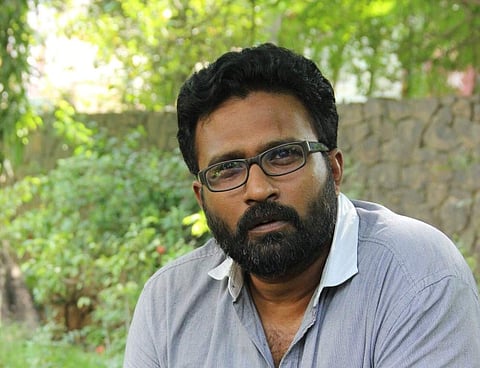

Taramani has taken a while to get its release date.
This isn’t a film with a popular hero. Perhaps if it had a conventional villain, we could have used that to sell the film in its poster. These days, releasing films is harder than it is to make them.
The film’s promos hint at an exploration of a contemporary relationship.
The film’s about a relationship in the modern era. You see, today’s woman needs a lover, not a bodyguard. The average Indian male doesn’t get that.
Would you say the average Indian male is chauvinistic?
I think all men are chauvinistic. Some know they are; some others don’t. My story in Taramani, about this age-old male-female dynamic, is one that has been told from Shakespearean days.
Why set the story in Taramani?
Taramani, the locality, is nothing like any other in Chennai. We don’t show it as an IT corridor. It’s an international, multi-lingual, multi-cultural space, one that resembles a global village. I wanted to see what a relationship would be like in this space.
The male lead hails from a village called Cooum, where the river originates. Like the river, he feels he’s also been polluted by the city.
He reminded me a lot of the protagonist in your debut film, Kattradhu Thamizh.
I think this interest in analysing a hero itself is slightly chauvinistic. (laughs) But yes, I realise what people say about my heroes. They say he is a loser, he has a long beard, he doesn’t get life, he is pessimistic. But I want to tell people that I treat my films as theses. They shouldn’t try to understand my film through its hero. The lead male character is simply there to illustrate my thesis.
Did you intend for the film to be your third in what’s called your globalisation trilogy?
If that’s how people see it, sure. Kattradhu Thamizh was about arts and humanities. Thanga Meengal was about primary school education. And Taramani, now, is about relationships. I live in a time of globalisation. It’s natural my stories are about it.
Would you agree your stories act as arguments against globalisation?
I’m neither for nor against it. There’s no turning back from it. But it has done a lot of good too. A few years ago, working women were being picked up and dropped by the men of their house. But today, they are more independent.
Men, however, for the most part, still try to possess them. Sometimes, I wonder if men invented religion only to keep women in check, to dictate what they should wear and where they should go.
You’ve stated before that your favourite novels and films influence your work.
Kattradhu Thamizh was inspired by Albert Camus’ The Stranger. When a man has no family, no home, no identity, he’s free to do anything. Taramani has influences of Kubrick’s Eyes Wide Shut, Polanski’s Knife in the Water… Also, when I say that I’m inspired, it doesn’t mean I’ve taken dialogues or scenes from these works. I try to analyse those concepts within the framework of our society. I wish I had the calibre of my heroes, Polanski and Kubrick. I’m jealous of their ability. But what I have unshakeable belief in is that there’s no such thing as politically correct art. The art I create is my philosophy drawn from truths I’ve observed around me.
The censor board doesn’t seem to have taken too kindly to Taramani.
Well, in my opinion, most films that are certified U and U/A should actually be certified A. They contain concepts that children shouldn’t have to understand.
In a scene, a group of men are harassing the heroine, but that’s not a problem for them. When she responds with the ‘F’ word, it becomes a problem. I wish they’d certify films with an A certificate every time men are shown harassing a woman. Why the double standards?
You’ve stuck by Yuvan through the years.
He’s the true hero of my film. He’s at a stage right now, where he’s bored with doing the regular stuff. I would love to hear the music he will compose a few years later. As a man changes, so does his music. His music isn’t just for today. In a sense, my films aren’t too. When Kattradhu Thamizh released, no critic realised it was about globalisation.
You’re saying your films are ahead of their time?
No, no. I’m just saying any art is not just for today. Why else am I still rewatching Polanski’s Tenant? When someone tries to analyse my film’s content, they’re actually analysing themselves. Art makes you reflect on yourself. When I read a review of my film that digs into my content, I can see the critic’s life opening up to me.